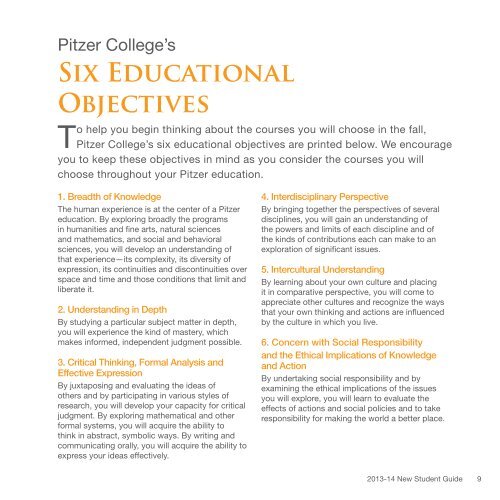Pitzer College New Student Guide 2013-14
Pitzer College New Student Guide 2013-14
Pitzer College New Student Guide 2013-14
Create successful ePaper yourself
Turn your PDF publications into a flip-book with our unique Google optimized e-Paper software.
<strong>Pitzer</strong> <strong>College</strong>’s<br />
Six Educational<br />
Objectives<br />
To help you begin thinking about the courses you will choose in the fall,<br />
<strong>Pitzer</strong> <strong>College</strong>’s six educational objectives are printed below. We encourage<br />
you to keep these objectives in mind as you consider the courses you will<br />
choose throughout your <strong>Pitzer</strong> education.<br />
1. Breadth of Knowledge<br />
The human experience is at the center of a <strong>Pitzer</strong><br />
education. By exploring broadly the programs<br />
in humanities and fine arts, natural sciences<br />
and mathematics, and social and behavioral<br />
sciences, you will develop an understanding of<br />
that experience—its complexity, its diversity of<br />
expression, its continuities and discontinuities over<br />
space and time and those conditions that limit and<br />
liberate it.<br />
2. Understanding in Depth<br />
By studying a particular subject matter in depth,<br />
you will experience the kind of mastery, which<br />
makes informed, independent judgment possible.<br />
3. Critical Thinking, Formal Analysis and<br />
Effective Expression<br />
By juxtaposing and evaluating the ideas of<br />
others and by participating in various styles of<br />
research, you will develop your capacity for critical<br />
judgment. By exploring mathematical and other<br />
formal systems, you will acquire the ability to<br />
think in abstract, symbolic ways. By writing and<br />
communicating orally, you will acquire the ability to<br />
express your ideas effectively.<br />
4. Interdisciplinary Perspective<br />
By bringing together the perspectives of several<br />
disciplines, you will gain an understanding of<br />
the powers and limits of each discipline and of<br />
the kinds of contributions each can make to an<br />
exploration of significant issues.<br />
5. Intercultural Understanding<br />
By learning about your own culture and placing<br />
it in comparative perspective, you will come to<br />
appreciate other cultures and recognize the ways<br />
that your own thinking and actions are influenced<br />
by the culture in which you live.<br />
6. Concern with Social Responsibility<br />
and the Ethical Implications of Knowledge<br />
and Action<br />
By undertaking social responsibility and by<br />
examining the ethical implications of the issues<br />
you will explore, you will learn to evaluate the<br />
effects of actions and social policies and to take<br />
responsibility for making the world a better place.<br />
<strong>2013</strong>-<strong>14</strong> <strong>New</strong> <strong>Student</strong> <strong>Guide</strong> 9






![Anticipated Courses SP14 [pdf] - Pomona College](https://img.yumpu.com/25363335/1/190x245/anticipated-courses-sp14-pdf-pomona-college.jpg?quality=85)









